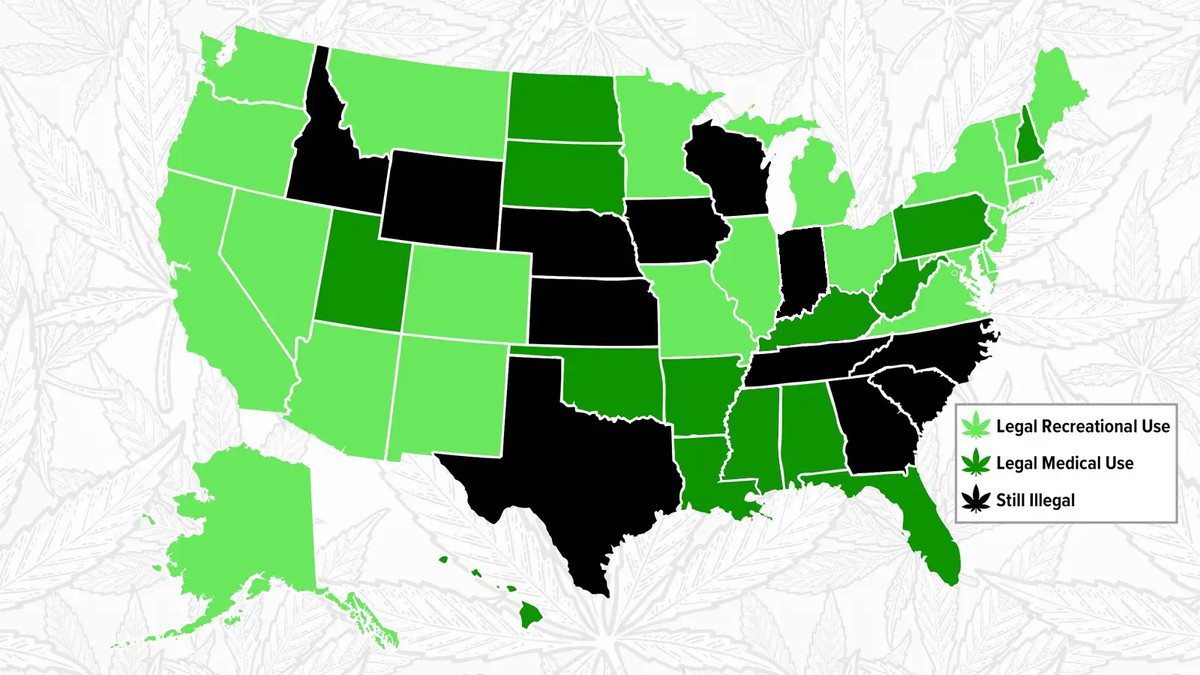The United States’ slow transformation into a 420 paradise continues apace: During the November 2023 election, Ohio voters overwhelmingly voted to legalize the recreational use of cannabis, setting the stage for retail sales in those areas at some point in the future. It was a strong win for legalization in a state that’s been reliably conservative in recent election cycles.
Ohio was the third state, following Delaware and Minnesota, to pass legalization measures in 2023, bringing the number of states where recreational use is permitted to 24; cannabis (as opposed to THC-free CBD) is still (more or less) wholly illegal in 12 states, while the remainder allow for legal medical use, with varying restrictions.
Even as Americans grow more divided politically, cannabis continues to gain ground with every election cycle—and even in-between—as public support grows, with nearly 7 or 10 Americans favoring legalizing the possession of small amounts of the drug for personal use, according to the results of a Monmouth University poll published in the Washington Post. Though the majority of states that have legalized are typically considered “blue”—suggesting one political party remains way more chill than the other—even Mitch McConnell’s own Kentucky recently legalized cannabis for medical use, though the measure doesn’t take effect until 2025.
Despite Joe Biden’s vague gestures at federal legalization last year, including asking the Department of Justice to “review” the drug’s Schedule I certification under the Controlled Substances Act, weed remains illegal at the federal level, and in the same category as heroin and other drugs considered to have “no medical use” and a high potential for abuse and dependence. (In the wake of Ohio’s legalization vote, the Biden administration reaffirmed that the president’s stance on federal legalization remains unchanged, which is to say, it’s not going to happen any time soon.)
Here’s a rundown of where weed is legal for recreational and medical use (and where it isn’t).
In addition to Ohio, which legalized recreational cannabis via a ballot measure, Delaware and Minnesota changed their laws via legislation earlier this year.
In 24 states, including 2023’s new additions, weed is treated like alcohol—it’s legal for adults (21 and over) to purchase and is regulated and taxed by the government. The specifics of what you can purchase and possess (and where) vary a bit by state. These states also have medical marijuana.
- Alaska
- Arizona
- California
- Colorado
- Connecticut
- Delaware
- Illinois
- Maine
- Maryland
- Massachusetts
- Michigan
- Minnesota
- Missouri
- Montana
- Nevada
- New Jersey
- New Mexico
- New York
- Ohio
- Oregon
- Rhode Island
- Vermont
- Virginia
- Washington
Recreational weed is also legal in Guam and the Northern Mariana Islands.
In the District of Columbia, it’s legal to possess and grow limited amounts of weed, but there are no commercial sales outside of medical marijuana from a limited number of licensed dispensaries.
A number of states have legalized medical marijuana but do not allow broader recreational use.
- Alabama
- Arkansas
- Delaware*
- Florida
- Hawaii*
- Kentucky
- Louisiana
- Minnesota*
- New Hampshire*
- New Mexico*
- North Dakota*
- South Dakota
- Ohio*
- Oklahoma
- Pennsylvania
- Puerto Rico
- South Dakota
- Utah
- Virginia*
- West Virginia
*According to the Marijuana Policy Project, these states have also decriminalized marijuana, reducing or removing jail time for possession of limited amounts of weed.
Nebraska and North Carolina have laws that decriminalize marijuana to a degree, meaning penalties for first-time possession of small amounts of weed are reduced. Both have a suspended sentence for a first offense—Nebraska imposes a fine and a possible drug education course. Medical marijuana legislation has failed in both states.
The remaining states do not permit broad medical or recreational marijuana—nor is weed decriminalized—though all except for Idaho allow access to low-THC products containing CBD for medical use (which, while technically “legal medical cannabis,” isn’t quite the same thing as a robust legal medical market).
- Georgia
- Idaho
- Indiana
- Iowa
- Kansas
- Nebraska
- North Carolina
- South Carolina
- Tennessee
- Texas
- Wisconsin
- Wyoming
Originally published in 2020, this article has been updated periodically updated to reflect changing laws around the country. It was most recently updated in November 2023.

